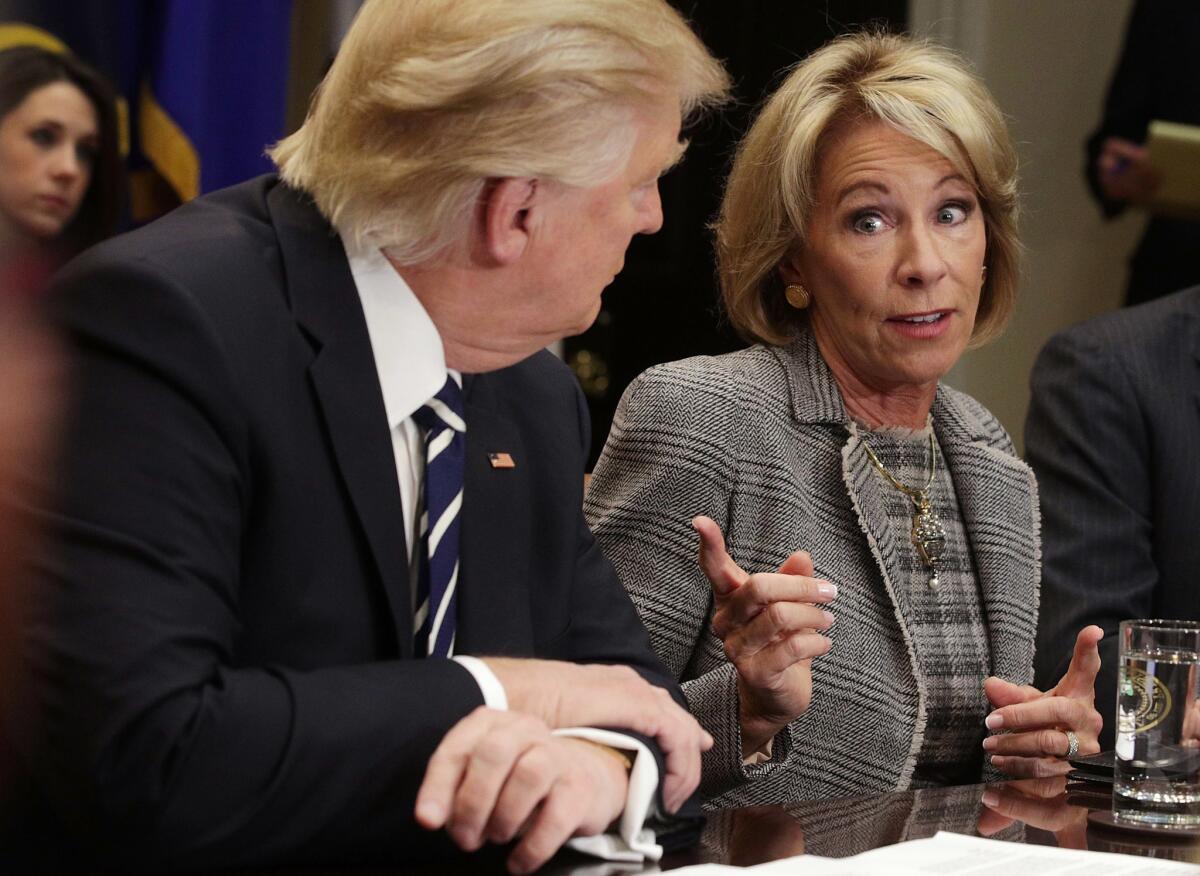Months in, Betsy DeVos still has no answers on major education issues

Secretary of Education
She hasn’t taken questions from reporters at mainstream news outlets, and she recently declined an invitation to address a conference of education writers in Washington, D.C.
On Wednesday, she was cross-examined by lawmakers in a House appropriation subcommittee as she sought to justify the education cuts in President Trump’s proposed budget.
“This budget lays out a series of proposals and priorities that work toward ensuring every student has an equal opportunity to receive a great education,” DeVos told them “It focuses on returning decision-making power and flexibility to the states, where it belongs, and giving parents more control over their child’s education.”
Here are a few moments that stood out.
On civil rights enforcement
The issue of civil rights enforcement came up quickly.
Rep. John Moolenaar (R-Mich.) asked DeVos, on behalf of a student in his district, whether there is “a role for the federal government in meeting this challenge” of reducing incidents of sexual assault on college campuses.
DeVos responded by saying the department's Office for Civil Rights “is very committed to investigating complaints that reach the office. We are invested in fully funding OCR.”
But Trump's budget proposal actually would cut just under $2 million from that office.
"There are a number of viewpoints on how the rules surrounding this have been implemented, and we are looking at this very closely,” DeVos continued. “It is certainly an issue for the Office of Civil Rights to engage with and for the Department of Education to grapple with, but we are not at a point where we can communicate any change in direction or any new information at this point.”
It is unclear from DeVos’ response whether OCR, which is responsible for enforcing civil rights laws, will continue to take the Obama administration’s approach of actively seeking out wrongdoing and naming the colleges under investigation — or whether it will return to the Bush-era style of doing lower-key "desk audits" of website and just responding to queries that come its way.
DeVos also has never addressed numerous other OCR questions. Does she believe that the racial disparity in school discipline rates is a problem? Should ADHD be classified as a federally protected disability?
We are not at a point where we can communicate any change in direction.
— Betsy DeVos, on her department's approach to reducing sexual assault on college campuses
On states’ rights, flexibility and the role of the federal government
Democrats accused DeVos of hurting students by leaving everything up to the states.
Following a tense exchange about the federal government’s role in protecting students from discrimination, especially in private schools accepting public money, Rep.
DeVos said she was “not in any way suggesting that students should not be protected,” and reiterated her promise to “investigate any complaints … surrounding allegations or issues of discrimination.”
Earlier, when pressed, DeVos would not say that she would prevent federal money from flowing to states that fund private schools that discriminate against LGBT students. (Her staff later clarified that DeVos would uphold anti-discrimination laws.)
Betsy DeVos would not agree to bar discrimination by private schools that get federal money »
On what constitutes a budget cut
There was some disagreement about the flow of money.
Several lawmakers accused DeVos of taking money from poor students to fund new school-choice programs, including a $250-million pilot program to encourage states to help families use public money to attend private schools. DeVos said she wasn’t pulling cash from those programs helping poor students because the new ones also are intended to help disadvantaged kids.
“The money has to come from somewhere,” said Rep. Lucille Roybal-Allard (D-Downey). “Maybe the intentions are good, but the actual impact is not meeting those intentions.”
When DeVos talked about supporting historically black colleges, Lee said a program that would help students in those schools pursue masters degrees got no money in the Trump budget.
“It’s not a cut because we haven’t funded it yet,” DeVos said.
Lee said the program had been funded once, to the tune of $7 million.
“You are eliminating it, or you’re not?” Lee pressed.
“No,” DeVos said.
“Okay, so you’re going to restore it?” Lee asked.
DeVos said it would be up to Congress.
To which Lee replied: “So you’re cutting it!”
On standards, curriculum and the Common Core
The Every Student Succeeds Act prohibits the federal government from prescribing states’ curricula. That provision was added in response to concerns about the federal government’s role in promoting the Common Core.
Rep.
“Absolutely,” DeVos told her. “You have my commitment that the department is going to implement and follow the law.”
DeVos’ comments on that score seem to conflict with previous promises that she and other administration officials have made to end the Common Core — since doing so would require the federal government to meddle with states’ curriculum choices.
In what seemed to be ad libbing, DeVos also said she might create a competition that encourages states to set higher standards — something the Obama administration basically did — “but in no way should it be a top-down, one-size-fits-all solution from the federal government.”
Start your day right
Sign up for Essential California for news, features and recommendations from the L.A. Times and beyond in your inbox six days a week.
You may occasionally receive promotional content from the Los Angeles Times.




